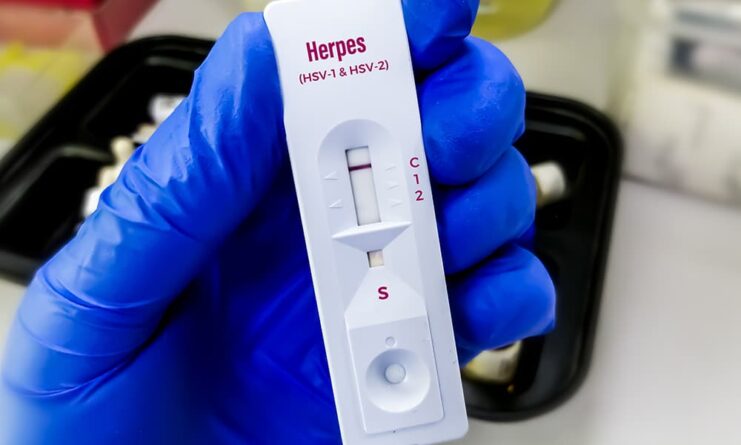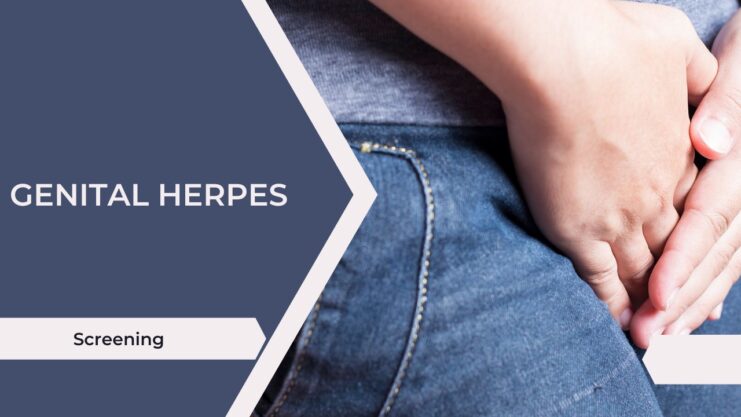As we embark on this journey of understanding and demystifying genital herpes, let’s take a moment to acknowledge the courage it takes to delve into such a personal and often stigmatized topic. It’s like standing at the edge of a vast ocean, knowing that we’re about to dive into waters that are often left unexplored. But just as the ocean holds a world of undiscovered beauty, so too does our exploration of health topics like genital herpes hold the potential for empowerment, understanding, and compassion.
Genital herpes, a condition often shrouded in mystery and misconceptions, is more common than many of us realize. It’s a silent traveler, journeying through lives and relationships, often leaving a trail of questions and concerns in its wake. But it’s time to bring it into the light, to look it in the eye, and to say, “We’re not afraid to understand you.”
Screening for genital herpes is an essential part of this understanding. It’s like a lighthouse guiding us through the fog, providing clarity amidst the unknown. It’s a tool that empowers us to take control of our health, to make informed decisions, and to navigate our lives with confidence.
So, let’s step forward together into this exploration of genital herpes screening. Let’s arm ourselves with knowledge, break down the walls of stigma, and foster an environment of understanding and compassion. Because every journey begins with a single step, and this is ours.
There are 2 types of test for Herpes:
1. Blood test – for people without symptoms
2. Swab test – for people with skin symptoms like rash, ulcer, blisters etc
Genital Herpes is very common and is incurable. Herpes infection of the genitals can be caused by either Herpes Simplex Type 1 (HSV 1) or Herpes Simplex Type 2 (HSV 2).
Previously, Herpes was mostly diagnosed via physical examination of typical symptoms and confirmed by testing swab samples taken from the blisters. However, since up to 80% of people with Herpes do not show any symptoms, this method misses out the vast majority of people who carry the Herpes virus.
Previously, blood tests for Herpes were extremely inaccurate and almost impossible to interpret. Now, however, newer blood tests have greatly increased in accuracy thus giving us the option to screen for asymptomatic Herpes infections.
However, before you run to your doctor’s and request for a blood test for Herpes, there are certain things you should know about.
How accurate are Herpes blood tests?

About 96% sensitive and 97% specific. In other words, if the test says you do not have Herpes, it is wrong 4% of the time and if it says that you do, it is wrong 3% of the time. This is when the Index Value comes into play. If the Index Value is more than 3.5, it is likely that it is a true positive.
Of course, the first line for Herpes antibody identification is the Western Blot but that is not available in Singapore. Even then, the accuracy only reaches 99%.
Please remember that all the above only applies to people with no symptoms. If you do get symptoms, you should see a doctor for a swab test.
What are the symptoms of Genital Herpes?
Classic textbook symptoms are a cluster of painful blisters appearing in crops of 3 to 5 that break and form ulcers. Several crops would appear over a few days. Initial attacks can last up to 3 weeks. The blisters are always surrounded by red skin earning them the rather romantic name of ‘dewdrops on a rose petal’.
However, symptoms are not always classical. Herpes symptoms have been misdiagnosed as yeast infections, urinary tract infections, razor burn, insect bites, friction rubs, allergic reactions etc
When should I test for Herpes?
Antibodies to Herpes can usually be detected in 2 to 3 weeks from the time of infection. However, detectable antibodies can take up to 16 weeks to appear.
Can I swab normal looking skin to look for Herpes?
Yes, you can. In fact, there was a study that used this method to determine the frequency of asymptomatic viral shedding of Herpes. But since it is estimated that the virus only sheds 20% to 25% of the time, you will need many swabs in order to get an accurate answer. This can be very costly.
How effective are condoms against Herpes?
Apparently not very useful at all. There was one study that said consistent and correct used of condoms provided 30% protection against Herpes.
How effective is suppressive treatment in preventing Herpes transmissions?
We do not really know. Studies have quoted anything from 48% to 71% reduction in risk of transmission. So we know that it does reduce the risk of transmission. And since these medicines have very few side effects if at all, and are rather low cost, doctors are advised to at least speak to their patients about the option.
So should I test for Herpes if I have no symptoms?

This is the golden question. Everyone can deal with a clear result. So if you test and the test shows you have no Herpes infection, all is well and good.
The question to ask yourself is can you deal with a positive result? Getting a positive Herpes test can be emotionally overwhelming. So you need to ask yourself what will you do if you are tested positive.
If you are doing the test for a specific reason like you intend to take suppressive treatment to protect your spouse if you are positive etc then I think that is a very good reason to test. In other words, the test results will make a difference in clinical decision-making. If you are testing because you just want to know, then please be emotionally and psychologically prepared to deal with a positive result.
Also, you have to bear in mind that the blood test can only tell you if you are infected with Herpes or not. It does not tell you where the infection is. If you test positive for HSV 2, then most likely you have genital herpes. This is because HSV 2 mostly infects the ano-genital region. However, HSV 2 has been found in the head and neck area too. HSV 1 is much more complicated as it can infect both areas just as frequently. If there are no symptoms, it will be impossible to determine where the Herpes infection is.
Final Words
As we wrap up this enlightening journey into the world of genital herpes and its screening, it’s important to remember that knowledge is power. Understanding this condition, knowing how to screen for it, and being aware of the implications of a positive result are all crucial steps towards taking control of your health.
Genital herpes is a common condition, often misunderstood and stigmatized. But it doesn’t have to be that way. By shedding light on this topic, we can break down barriers, dispel myths, and foster a more compassionate and understanding environment.
Screening for genital herpes is a tool that can empower us, providing clarity and confidence. But it’s also a step that requires careful consideration and understanding of the potential outcomes. It’s not just about getting a test; it’s about understanding what the results mean and how they can impact your life.
For a deeper understanding of other sexually transmitted infections, such as HPV, which can cause genital warts, you might find this resource helpful.
Related Posts:
- HIV ELISA Test And HIV ECLIA Test: The Power of Accuracy
- When and How to Test for Syphilis: Empower Yourself…
- Genital Warts (Human Papilloma Virus): What You Need to Know
- Herpes zoster (Shingles): Not Just a Senior's Concern
- Importance of STD/STI Screening for Women: Taking…
- MMM2 – HIV Screening and Diagnosis












